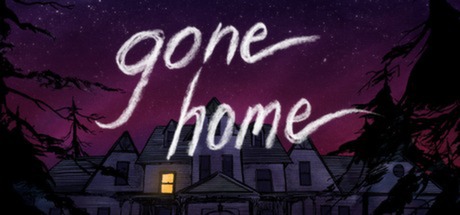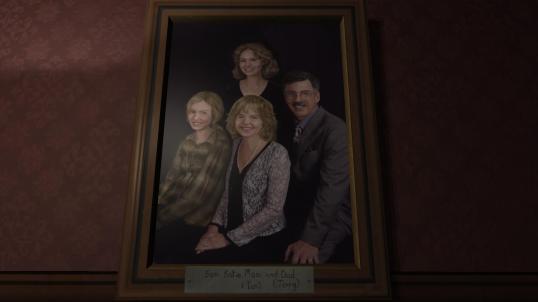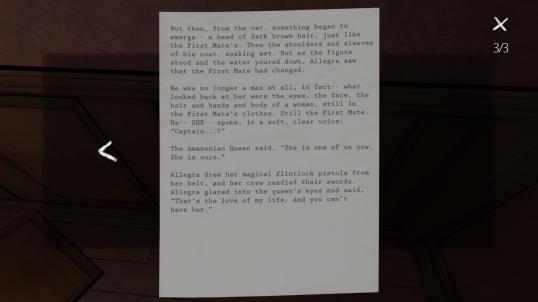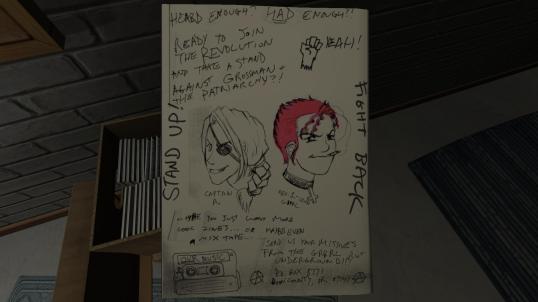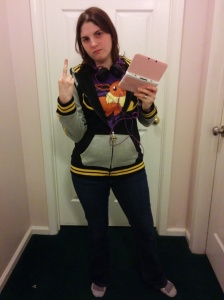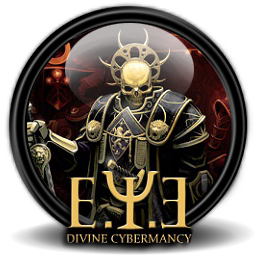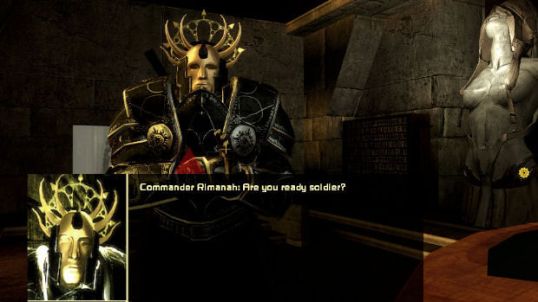Warning: this read is LONG AS HECK! A lot of games are pretty poignant and come out at the right time. Gone Home is a game that came out about two months after DOMA and Proposition 8 were ruled unconstitutional by the supreme court. Being in the Army at the time, I literally watched the military go from “don’t ask, don’t tell” to “First Sergeant is going to help me and my partner get housing benefits.” It was a monumental time. I was actually in basic when Don’t Ask, Don’t Tell was repealed and everyone thought I was going to come out. Next morning at formation I was asked by several fellow soldiers and replied “I’m still rather fond of boobies.” But in the swell of history-changing happiness, it seems a doctrine slid into place that, even now, is permeating the industry and much of our society. Gone Home has a deeper, toxic narrative that uses the inspiring narrative of the game to hide and poke holes in American society, quietly going so far as to say that it should be restructured with women in the position of power over men.
In Gone Home you play Katie, the elder of two sisters who has just returned from a year-long trip to Europe. Throughout the game you find various postcards sent home by Katie from a variety of historic locations. This adds a sort of innocent perspective of family as perceived by someone removed from the conflict; but conflict in this game is constantly reviewed and discovered in the past tense, not personally experienced. In order to get a proper context for the events of Gone Home, you should get to know the remaining characters.
Sam Greenbriar is Katie’s younger sister and the primary focus of the game’s narrative. She seems to have started her last year in High School, but her grade is never explicitly stated. Sam meets a girl, named Lonnie, that she becomes friends with, but the relationship goes further than she ever expected and blossoms into a full romance. It’s 1995, so this doesn’t exactly go over well.
Janice Greenbriar is the mother of the household and, as the Head Conservationalist of Flintlock Forestry station, she is the bread-winner of the family. While Janice is assisting with the Takelma County Forestry Service in a controlled burn of a section of forest, Janice distinguishes herself and is promoted to Regional Conservation Management Director.
Terrence Greenbriar is the father of the household and is a writer struggling with his own flaws to create a successful sci-fi historic fiction series known as the “Accidental” series. Terrence is traditional and dreamy, but he seems given to periods of self-doubt and, possibly, depression. He struggles with his job, too, losing a good gig in reviewing music from one room to the next. The house they live in was recently acquired in a will from his recently deceased Uncle, a pharmacist named Oscar Mason.
Lonnie is Sam’s girlfriend, but it doesn’t start out that way. They just start out as girls being girls but it develops further. Lonnie is in ROTC and is training to join the Army. Lonnie exposes Sam to a whole new life and way of thinking that was previously alien to her, but Lonnie is very conflicted and this comes through often.
Daniel is a background character. He was friends with Sam when they were very young, before their recent move. Same actually describes Daniel as a “default friend” in a journal to Katie and generally only talks to Daniel to get his “good” Super Nintendo games. Sam is markedly slow to return these. Sam distances herself from Daniel as she grows up, claiming that he got “weird.”
Now, Sam meets Lonnie in the most innocent fashion, and it starts out as the two having fun and being girls. They explore the mansion, which neighborhood kids call the “Psycho House” since there was a tragedy that befell a previous owner, so it is rumored to be haunted. As it turns out, the house may very well be haunted and there are numerous secret passages within the building. Lonnie and Sam spend more and more time together, falling in love. For the longest time they keep their love a secret from Sam’s parents, but eventually it comes out. Now this would all be fine since this story is conveyed nicely and it is quite inspiring, but that is not all that lies within the text of this game.
While the girls are hiding their secret love, Sam creates two fictional characters, which she writes about. The telling of these stories comes in a reverse order, starting with the most recent first. I will start with the oldest one first, which is returned to Sam by Daniel. In a child’s handwriting, the story describes Sam and Danny exploring a forest, finding an ocean with a pirate ship in it and manning it. Sam declares that she will be the Captain and Daniel the First Mate. Daniel replies with an “Aye, aye, Captain!” This is two kids playing and seems genuinely innocent, but take note here that Sam automatically takes the dominant role in their relationship and Daniel accepts unthinkingly.
Our next entry in this miniature “narrative within a narrative,” the First Mate is in trouble and shit gets weird. After exploring the house for some time, you find hidden compartments in the walls. In one compartment is another story about Princess Allegra, as the pirate captain has by now been named, is searching for her First Mate in a forest. He has been captured by the Green Glacier Amazon Tribe. Upon confronting the Queen Amazon, Allegra tries to stop the Queen by throwing the sword at her hand. She is too late, though, and the First Mate falls into a vat of water. Things go quiet and the First Mate emerges from the water transformed from man into woman. Here is where shit gets weird. The Amazon Queen says “She is one of us now. She is ours.” Allegra responds “That’s the love of my life, and you can’t have her.”
Now, looking at this for face value, it seems like a story about the transformation of a girls sexual identity from hetero- to homosexual, given the context of the main story; however, in the context of the deeper narrative context provided by the actual characters. This story takes on a totally different hue, which I will return to later. Throughout the game, there are examples of women in a position of power over men, and it’s not even subtle or accidental – it happens in every possible relationship created in the game.
The only living primary male character is an example of male failure. His job is not working out because he is infecting his reviews of music, where readers want to hear about the quality and value of hardware, with tangents and diatribes about the ruination of his childhood. This is found in a typed letter from the reviews editor of Home Theatre Aficionado Magazine. Terrence also receives a letter from the publisher for his “Accidental” book series, Mercury Books, that due to sales of the second books being worse than the first, they would no longer continue to publish his work. Now, this all comes alongside the standard trope of older men being alcoholics. Gone Home serves this up by placing a bottle of whiskey atop the bookcase in Terrence’s office; then, later, the rejection letter from Mercury Books can be found in the bar, just down the hall. Here it looks like someone has recently spent a lot of time drinking by the sloppy placement of glasses on the bar and one on the table by the record-player.
Aside from failing at his work, Terrence is also failing as a father, at home. We’ve already established that Janice has a steady job, which she is good at – given her promotion, but there is something else going on under Terrence’s nose that he isn’t even aware of. Following Janice’s little story, you find that she has been spending a lot of time with a man named Richard Patermach. Rich is man that she met during the controlled burning operation with Takelma County Forestry Service. In what seems to be a personal room where she paints still-lifes, you can find a performance evaluation of Rich on the table. Janice, being in a position of superiority over this man, gives him a glowing review and even says that she will put in paperwork to request his transference to her forestry station. I mean, she cirlces all the ‘5s’ in a 1 – 5 evaluation scale, which TOTALLY doesn’t look suspicious. In the next room you find a romance novel about a “fireman” set against a background of a forest. Later on, beyond what is initially a locked door, you find some important scraps of paper: one is a receipt for a makeover given to Janice totaling 119.50$. Now that is expensive, but according to this inflation calculator that is worth 186.03$ in 2014, which isn’t a huge gap, but when you have a daughter in high school and one in Europe, a husband that is struggling and a house that is in disrepair – according to the electric company inspection in Terrence’s office – that is a good chunk of change. But why did she spend that much? Well, upon entering the dining room where mom and dad confront Sam about her sexuality, there is a table with a note bearing the Takelma County Forestry Commission’s logo. Between these scraps of paper lie a promotion notice for Janice and a manual from Takelma’s forestry commission. The note is from Rich and it invites Janice out to see a and EWF concert. His girlfriend wasn’t into the concert and he invites Janice instead. But there is no evidence she accepted, right? Wrong, ticket stub for Earth, Wind and Fire in the heating vent in the hallway. How can we guess at the motivations for accepting and assume it wasn’t innocent? Looking in the drawer behind the table sits a letter from janice’s friend, Carol, where she describes Rich as “our favorite flannel-clad hunk,” which describes Rich in terms of a character on the cover of a romance novel like the one in the backroom of Janice’s little personal room. Later on we find that Rich gets married and Janice and Terrence end up going on a couple’s retreat, which, according to the calendar in the kitchen and the pamphlet by Terrence’s new writing spot in the greenroom, where they will likely review their marriage and where it is going. I mean, Janice has been nothing but supportive of her struggling husband, why wouldn’t she feel the urge to leave him? But the support shown to her husband mostly seems like a way to cover for her deeper intentions and desires, considering there is one physical instance of her support and numerous others detailing the narrative between her and “our favorite flannel-clad hunk.” It is an objectification of a man with the female hegemonic gaze, just as is decried by feminists in terms of games where women are represented as sexual objects.
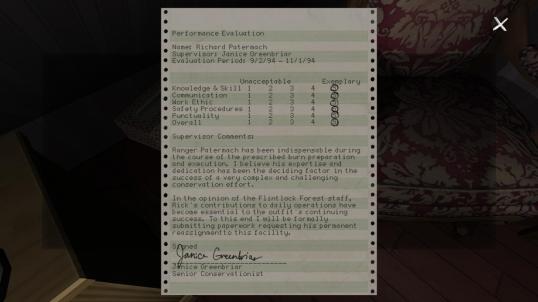
She knows this is supposed to be an objective rating of his job performance and not how he might be in bed, right?
Through the rejection of his life partner, we see that Terrence is cast as an impotent male in terms of his fulfilling the gender role a man is supposed to: the provider of the home. Hell, we even see an unused condom in one of Terrence’s drawers in their bedroom. It looks like it has been there for some time, and there is only one, so it is more like a “just in the wild case” rather than hopeful premeditation of a sexual exchange with his beloved wife, not to mention they could just use the pill for a more intimate encounter. It is the 90’s, afterall.
Terrence isn’t the only male rejected by a female. Sam, our leading character, has a childhood friends who she regards right off the bat as a “default” friend, since he lives right next door. She even goes so far to say that she only really valued their friendship because he had good videogames because he became weird. You’d expect someone that is made fun of at school for living in the “Psycho House” to look past the exterior at who a person really is, even if she is a lesbian. Lesbians can have friendships with white, hetero males and not want to be with them, I promise. When Daniel calls she rejects him by not calling back. He doesn’t even mention that he wants his game back until after what seems sustain cases of rejection. Sam is, honestly, a cold little girl that only considers males in terms of what they can give her. In the kitchen we see that Sam and Daniel finally reconcile when he returns the oldest page of the pirate story with the picture above and comes after Sam is confronted about her sexuality. She wants to talk about her remorse about their lost childhood friendship, but instead tells him about Lonnie and recent events and then tells him about “how sorry I was that I wasn’t his friend anymore.” This is nice and all, but it only comes after the boy has submitted to her, contacting her over and over and over with no response, asking for his game, trying to see her. Finally she reconciles with him because, why? Because he gives her some comfort in a tough time by hugging her and saying it’ll be ok, bringing a piece of her childhood self and reminding her that he had submitted to her from the very beginning. I think this is referred to colloquially as the “friendzone,” where a female keeps a boy around for the value of his emotionally supportive nature. This renders the guy more of a comfort object, similar to a teddy bear, rather than a person with his own thoughts and feelings.
And it doesn’t stop here! We never get the full story of what happened with Oscar Mason, but in a safe in the basement we find a letter that was written before he died to his sister, Mary Greenbriar. In the end of the letter he says “If no response is received, I shall henceforth accept my sentence, and one day simply cease to be.” Throughout the letter we get the impression that something had divided him from his family and, in the rejection of the letter, he is never reconciled. Like Terrence, who turns to the bottle to ease his emotional pain, we can suggest that Oscar may have done the same, the safe being filled with syringes and morphine syrettes. There is even a rubber hose used to constrict the veins of the person taking the medicine, so they bulge with pressure and are easier to find. You know, similar to the trademark hose of the heroine addict? In his final weeks, maybe even days, Oscar reaches out in an attempt to reconcile with family, but his letter is rejected without being opened: it is marked with a red ‘X’ and scribed with the words “return to sender.” By the admission of the last line of the letter, we can not only say that a judgement has been passed on him by Mary, but his situation is doubly cruel considering she never had the decency to open the damn thing. I mean, none of us liked my grandmother, but when she died we went to her bedside so she would know that, despite all the horrible things she did, we were still a family. That is a message infinitely more comforting than “return to sender” (subtext: so he can die sad and lonely with no one by his side.) So where men aren’t sexual objects in this game, they are impotent examples of their own gender role or outright rejected until they submit to the females in their lives.
There is another function that Oscar fills, even in death. Sam and Lonnie seek to contact his ghost with a Ouija board by performing a seance in the secret room under the stairs. This contributes to the completely bizarre atmosphere Gone Home carries throughout. With the flicker of lights, soft patter of rain at the windows and the lighting that occasionally lights up the halls, Gone Home has an ambiance right out of a horror game. It even has a jump scare in it. This feature, I think, shows an even more sinister and dark side of this game’s ideaology. Oscar Mason is dead, yes, but his death and potential spirit haunt Sam in her life to the point where she is bullied in school as the “Psycho House Girl.” We get the implication that the Uncle went crazy and this somehow resulted in his death. I was never able to explicitly discover why or how, but it haunts her throughout the game. Initially it’s only the bullying, but later we see a much more vague form of this influence.
This family is traditional and they keep a couple old bibles in the house. This is common, though, and could be dismissed, but then there is the film “Inside Edition,” which is mentioned in the game. In a scrap found in the room with Janice’s makeover bill, we find the schedule for the movie and description saying “Investigative team visits camp whose specialists help adolescents overcome deviant behaviour and homosexuality.” Since the film is in the parents room and clearly written in a feminine handwriting, we can assume it is the mothers. This would show the mother as being the true matriarch of her house, seeing a problem and using a film with religious undertones to uphold the most patriarchal aspect of their lives. Of course, her own brush with deviance at the EWF concert leads you to think that maybe she isn’t so committed to that. Either way, when the parents confront Sam, she remembers that it is Dad who really confronted her on this matter. He even leaves a note on the kitchen table, so since he is the one writing for Home Theatre Aficionado and records numerous films on VHS, it’s not a big step to consider the possibility that Dad told mom to record the movie.
Oscar’s other role in influencing Sam comes in his own religious quality. It is only truly discussed in the sole jump scare in the game, which takes place in one of the secret passages. After looking around the area a bit, you can find a cross that has the words “for god so loved the world he gave his only son.” When you grab this crucifix and examine it, the light bulb in the room explodes. Sudden, unprecedentedly creepy, and another tie to Oscar through the use of the supernatural. Oscar’s greatest role in this is similar to the ghost in Shakespeare’s Hamlet, which is Hamlet’s father, referred to as King Hamlet for differentiation. In Hamlet, the ghost comes back from the grave to tell Hamlet the secret about his Uncle Claudius. Given the powerful nature of Oscar’s spirit and his reaction to your touching his cross – there are many other things of his to touch, but this is the only one that induces a jump scare – you can assume that he is likely very religious. His spirit being such, he would disapprove of Sam and Lonnie’s relationship, and given their attempts to contact him and their playing in the secret places of the house – possibly more than just playing – Oscar would have the best view of their clandestine relationship. While he never says anything to either Terrence or Janice, the house has an overall foreboding ambiance, which doesn’t suit the love story at all. It feels more like Oscar represents the oppressive nature of the male patriarchy, expressed through religion. The supernatural affect of Oscar, linked through religion to the parents, would seem like a sort of thematic amplifier to personify the oppression of the two young girls. Though Oscar isn’t advising the parents take revenge on the girls from the grave, his disapproval echoes across their generations in attempt to oppress the girls from beyond the grave. Even if the mother would be the one that recorded the film, it would make sense since she is the head of the house and, thus, the one in the masculine role of power. If the spirit is trying to reach out to Terrence, the darker implication would be that Oscar, Terrence’s uncle, is trying to tell Terrence to take vengeance upon the women in his life for usurping his natural “head-of-household” gender role by enforcing religious strictures upon Sam, his daughter. Either way, the implications are pretty grim. That is a lot to take from the game’s themes, though. I mean, it’s not like there is a character in the game that personifies resistance against a greater male patriarchy that oppresses the deepest desires and natural state of the young women in ques… oh wait…

Kicking men in the face as they look up your skirt and making it a move against the patriarchy. A lost Marvel classic.
So where do they get the names? Well, Sam takes on the name of Captain Allegra here, as the character in her story, and Lonnie gets to be Rev-L-Ution Grrrl. you know, the one with the upside down cross on her choker? No wonder Oscar is trying to come back from the grave, Lonnie is an anti-establishment lesbian that fights every element of the male patriarchy all while being in the ROTC. One of the best parts of the game’s deeper story is where Lonnie explains her JROTC awards to Sam by drawing the awards. The description for the last award for Adventure Training reads “I am a born adventuress and no borders can hold me. The Army recognizes this.” She also has an award for rifle training which makes her a “certified killing machine” and an award for orienteering. Lonnie explains this last one as “the army thinks I can find my way around” but her having this award might be interpreted as “I can find my own way.” So, in this game her position in ROTC and her affiliation with the military serves only to characterize Lonnie as a male in a female body and, thus, the epitome of an anti-male revolutionary. The army is only used to make her stronger than all the other men in the game and point her out as unique, interesting and important. Lonnie – carrying even a distinctly unisex name – is an example of the Butch Lesbian trope.
Entertainingly enough, Sam takes on another trope similar to the Butch Lesbian, known as the Pirate Girl. I mean, she writes about a pirate girl, fancies herself as one and even dresses like one at some point. To quote the site from that link, the Pirate Girl trope often has a Dark and Troubled Past detailing how she ended up in this position; abusive fathers who they are in a “Well Done, Son” Guy relationship with seems to be a common theme. Now, I don’t know about you, but this suits Sam to a tee. Trouble past – Uncle goes crazy and dies. Yup. Abusive father is a little tougher, but he is a drinker and he does seem to focus on himself a lot. The issues he is having with his work, his writing and his love life might be enough for him to take this out on others, women or not.
So how does this narrative of women end? Well you won’t be able to guess, but the rejection of male patriarchy for the freedom of feminine justice embodied in the true love of our lesbian couple. Yes, I am dead serious. In a game full of weak male characters, men as oppressors and even men as oppressors through female couterparts in distinctly male gender roles, the game ends with a romantic “fuck you” to the male oppressors. How? Predictably toward the end, the real thing that separates Lonnie and Sam isn’t their parents, but the Army. What better example of a real, existing male patriarchy that one might fight against than the military? Religion is old school patriarchy, military represents the modern struggle. Lonnie leaves for the army and Sam goes to cry and sleep in the attic. She misses the first two calls, but the third she gets. it’s Lonnie and she’s stepped off the bus to basic training and is telling Sam she can’t live without her and that they will drive until they can find a place where they can just be together, likely New Hope, Pa. Now, this might just seem like a play on the usual romance film ending, but with lesbians, but think about this a second. If you are on the bus to basic, you’ve already signed the papers and handed your life over to service in the name of your country. If you try to bail at this point, you are effectively going AWOL. This is an offense punishable by law, so Lonnie’s actions are literally a big old middle finger to male-driven responsibility and the patriarchy. Not to mention, Lonnie came to be in this position because she looked up to her Dad’s old army buddies, so it is in all ways Lonnie telling off everything male since it was a decision put into her by the influence of older men.
This is why the house is empty when Katie comes home. Sam would be there, but she is off supporting bad life decisions. I was touched at the end, but then I really started to think about what it would mean. Sure, Sam and Lonnie might get a few good years together at best, but one day the man will be knocking on their door with a warrant full of feminine oppression to take Lonnie off to federal prison. But that isn’t even the ending to the narrative of the game’s text. The ultimate message in this game is more deeply hidden in a letter from Terrence’s father.
This preachy letter combines with the feminist narrative to create a big old fuck you to something particular here. let’s see if you can guess it:
“An author’s work is the externalization of that which he holds dear (and that which he fears), and in this respect I believe your work was successful. But the lens through which the personal shone was needlessly clouded by genre cliches and implausible dimestore science-fictional dei ex machina. The great authors speak of their life’s milieu in clear and honest tones, the lens crystal that refracts their thoughts without distortion. […] I urge you to shed artifice. You can do better.”
This preachy little letter can be found in the basement and is the only letter from the male character with the only positive representation in the game. Granted, we can probably assume he is either really old or dead, so he is still a decently impotent male – maybe even literally – to suit the feminist attitude of this game. He is also Terrence’s father and, being male, Terrence will follow his advice unthinkingly. And he does, too. The office is filled with chaotic notes on a bulletin board as Terrence reaches deep inside for something better. In the greenroom typing area – a move that might have been an attempt for a fresh, new perspective – we find Terrence’s synopsis for the last book in his “accidental” series and it describes the main character having to save himself.
I call this letter, The Fullbright Company’s letter to the gaming industry. Gone Home’s critics often dig into this game for being a walking simulator and having no real “game” features. This game would be best called a dull adventure game, but they wanted it to be this big, artistic masterpiece: poignant, timely and edgy. In this letter, the developers of the game tell you what they want to see in the industry as a whole and, combined with the other deeper narratives of this game, it is a bleak prospect: they want to tear down the oppressive patriarchy of games with exaggerated tropes and over-the-top themes. They want games to become less ludic and more film-esque. See the reason this thinking is fundamentally flawed is simply that games were created originally to be games: fun, meaningless little pieces of entertainment that get your through a day. Recently, games have taken on a far more artistic trend, becoming more narratively advanced and deeper as a result, but to take everything out of a game that makes it fun just shows the drive of a rebellious sect of videogaming. This is not unlike the spate of absurdist films way back in the day, like Un Chien Andalou. Films like these were often artistic as hell and shed the existing trappings and tropes of film like “the carapace of a bug” but these movements often die out quickly due to their cliquish sentiment and limited appeal. They are an important and interesting piece of history that is often referenced in films, but they ultimately just represent the art in terms of “overly artistic crap meant for a small clique.”
Don’t get me wrong, I like artistic games, but not if the game element has been altogether erased in favor of a preachy and, frankly, insulting narrative. This game even makes inside jokes about feminist film theory by suggesting how to “subvert the male gaze,” which is an element of film theory that says the way women are displayed is often used as a sexual signifier of women in terms of what men want from them. It represents objectification of the woman’s body by the use of the camera ti display them in a sexual manner, as a man might look at a woman with his eyes. You know, following her ass or looking down her shirt at the right time. Modern film is admittedly guilty of this, but Gone Home’s calling this out only proves that this was a contrived piece of feminist workmanship. Like, it was a fucking sign. Ironically, right across the room the father had a porn mag buried in a box of his own discarded books, whose publication was halted. A box of male degradation.
Overall, without all the feminist input, this game is alright. Without paying much attention to anything but the lesbian narrative, one gets a touching game about real love and facing adversity as a young homosexual. But this story is the cover for a story that is as socially intolerant of men as Birth of a Nation was for black people. I don’t mind a so-stated “non-game,” but it still has to carry elements of its media. Putting players into a world where there is nothing resembling a game at all is similar to someone selling a movie that is just a series of pictures of letters on the screen set to music that the viewers have to read to get the story then saying “it’s the artistic direction of the industry.” That is stupid. Truly talented developers take the ludic characteristics of a game and weave in the narrative like so much thread in a tapestry. It is relevant to the industry and its consumers and has something deeper to it that shows it has soul beyond just killing some dudes.
This game looks nice and plays well, but the speed at which your character moves is deliberately slow and infuriating. The whole game takes 2 hours only because you move so slow. Judging this as a game would give it a unprecedentedly low rating, but this isn’t a game: it’s an interactive narrative. It is preachy, oppressive, and is certainly not the future of the industry. A true artist does not have to drain the color from a piece to make it profound, why do you think people make fun of hipsters that take pictures of their food, apply a sepia tone and post it on Instagram? I am glad that I got this game on the Humble Bundle, because i didn’t give these people more than a few cents for a game that is 19.99$ on Steam. This game should be going for FAR less than that, but everyone got so worked up over its artistic and deep narrative that they missed what this game was really about. The funny thing is that they missed a message so toxic that they didn’t realize they were supporting a narrative of anti-male hate. I am not an anti-feminist, I would say I am a feminist. Feminism is not supposed to be about oppression of the opposing sex, it is about bringing men and women together as equals so we can create a better tomorrow. Gone Home does none of that. I’ll be looking for the sequel to this game where Lonnie is taken away by the government and Sam leads a feminist revolution to overthrow the oppressive, patriarchal government to free Lonnie. Oh, no. That would require killing dudes, and might make the game too much fun.
